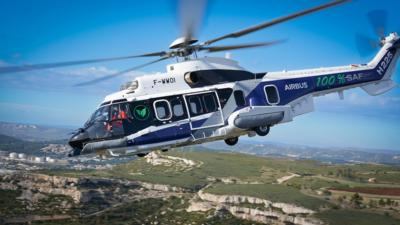Thu, Nov 11, 2021
Continuing Sustainable Fuel Work at Marignane Shows Progress
Airbus completed the first ever helicopter flight using 100% sustainable aviation fuel as part of its SAF development. As the aviation industry around the world looks to upcoming emissions, sustainability, and environmental targets, manufacturers are preparing for alternative fuels to take the stage from traditional petrochemical fuels. Airbus has launched a user group dedicated to the evaluation and integration of SAF into the rotary-wing community.

It has been a banner year for sustainable fuel, with rotorcraft competitor Bell Canada announcing the use of blended SAF in its training, transit, and customer delivery operations, with efforts to move to 100% SAF in the near future. Changing fuels is never an entirely simple process in aircraft, as safety and reliability are paramount, but stakeholders are confident it is the way forward for the industry. Airbus specifically publicized their use of the unadulterated fuel, no small feat when the currently approved SAF blend is capped at 50%.
The flight campaign successfully flew with an unblended SAF, provided by TotalEnergies, derived from used cooking oil. The H225 test helicopter apparently functioned well, and boasted a 90% CO2 reduction compared to regular jet fuel. Continued use and testing will prove what effects a longer-term flight regime has on the aircraft, but Airbus chief technical officer Stefan Thome, sounds optimistic.
“While all Airbus helicopters are certified to fly with up to a 50% blend of SAF mixed with kerosene, it is our Company’s ambition to have its helicopters certified to fly with 100% SAF within the decade. Today’s flight is an important first step towards this goal”, said Thome.
“SAF is an important pillar of Airbus Helicopters’ decarbonisation strategy because it provides immediate CO2 reduction with no negative impact on the performance of the helicopter,” he added. “I thank our partners Safran Helicopter Engines and TotalEnergies for their important collaboration in making today’s flight a reality. Further cooperation among all industry stakeholders is essential to overcome the challenges associated with implementing SAF widely and to make real progress in reducing the aviation industry’s CO2 emissions”.
More News
From 2023 (YouTube Edition): "Ain’t Your Daddy’s Super Cub”—Don Wade Co-owned by Don and Ron Wade—the former of Don’s Dream Machines, a storied >[...]
Pilot-Rated Passenger Reported That The Pilot Did Not Adequately “Round Out” The Landing Flare And The Airplane Bounced And Yawed To The Right Analysis: The pilot state>[...]
Dead Reckoning Dead reckoning, as applied to flying, is the navigation of an airplane solely by means of computations based on airspeed, course, heading, wind direction, and speed,>[...]
Aero Linx: Lake Amphibian Club This website is created and sponsored by the Lake Amphibian Club, to help spread the word about these wonderful, versatile amphibians that can land j>[...]
“I am deeply honored to be sworn in as NASA administrator. NASA’s mission is as imperative and urgent as ever — to push the boundaries of human exploration, ignit>[...]
 Classic Aero-TV: In Praise of Alabamas Patriot Aircraft USA
Classic Aero-TV: In Praise of Alabamas Patriot Aircraft USA NTSB Final Report: Cirrus Design Corp SR22
NTSB Final Report: Cirrus Design Corp SR22 ANN's Daily Aero-Term (12.21.25): Dead Reckoning
ANN's Daily Aero-Term (12.21.25): Dead Reckoning ANN's Daily Aero-Linx (12.21.25)
ANN's Daily Aero-Linx (12.21.25) Aero-News: Quote of the Day (12.21.25)
Aero-News: Quote of the Day (12.21.25)



